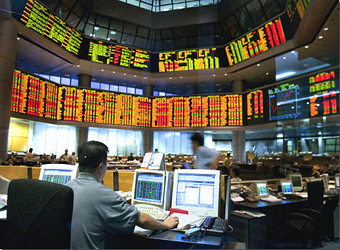Asian markets fell on Thursday after a mixed start, amid uncertainty over the U.K.’s exit from the European Union and as the dollar strengthened.
Japan’s Nikkei 225 slipped 0.35 percent, likely due to prolonged yen strength. The yen is seen as a safe-haven currency, but a stronger yen is generally negative for many Japanese companies as export earnings are reduced.
Shares of Toshiba turned positive, up 3.37 percent, ahead of an extraordinary shareholders meeting.
The Japanese conglomerate’s U.S. subsidiary Westinghouse Electric filed for bankruptcy on Wednesday, after it posted a multi-billion dollar write-off due to cost overruns at four nuclear reactors under construction in the U.S.
The ASX 200 was up 0.2 percent, led by its materials and energy sub-indexes, after official data showed that job vacancies have risen 1.8 percent to 182,400 from the previous quarter. This was the highest number of job vacancies since May 2011, and seen as a positive for Australia’s labor market.
Australia began evacuating thousands of people from resort islands in the tropical northeast on Thursday, as water supplies began to run low, Reuters reported. On the mainland of Queensland, tens of thousands of people were still without power, as officials warned of more heavy rainfall in the wake of Cyclone Debbie.
In South Korea, the Kospi index slipped 0.3 percent.
Samsung Electronics, which released its Samsung Galaxy S8 smartphone in South Korea today, was up 0.53 percent. The latest model is the company’s first premium smartphone since its September recall of all Galaxy Note 7 devices due to its fire-prone batteries.
The Shanghai composite dropped 1.12 percent and Shenzhen composite fell 1.78 percent. Hong Kong’s Hang Seng index was down 0.47 percent.
The dollar broke above the 100 handle it has hovered at for the past eight sessions, to trade at 100.05 against a basket of currencies. Against the greenback, the yen was weaker at 111.23 and the Australian dollar was at $0.7673.
U.S. equities closed mostly higher on Wednesday, led by energy.
The Dow Jones industrial average fell 0.2 percent to close at 20,659.32, the S&P 500 rose 2.56 points to end at 2,361.13.
The Nasdaq composite closed up 0.38 percent at 5,897.55. Over in Europe, stocks closed higher on Wednesday as investors remained calm over Britain’s Brexit proceedings.
The pound and the euro both fell against the dollar when the official letter triggering Article 50 was handled to European Council President Donald Tusk.
At 12:24 pm HK/SIN, the pound traded at $1.2443, lower than highs seen at 1.2460 seen yesterday but the euro eased to $1.0751, compared to yesterday’s highs of $1.0814.
“The weakness in sterling was directly related to all the uncertainty and questions that we know have, after the U.K. began these proceedings.
There’s a lot more questions than answers, I do believe that we could see further sterling weakness,” Kathy Lien, managing director at BK Asset Management told CNBC.
Lien added that she expects further pressure to the pound as the EU “are not going to start negotiations with the U.K. from an area of weakness and will have a hard-line stance.”
Reuters reported European Central Bank (ECB) policymakers were wary of changing their policy message after tweaks this month upset investors and raised chances of a surge in borrowing costs.
“Markets were a tad taken aback that the ECB made an effort to clarify its neutral-ish with accommodation commitment stance and dial back over-interpreted hawkish slant,” said Vishnu Varathan, senior economist at Mizuho Bank, in a Thursday note.
“We too think that the ECB is not yet ready to commit hawkishly yet; and not just because the Euro-zone has just started with the divorce proceedings,” he added.
Crude oil prices slipped on Thursday Asian time, after futures surged 2 percent on Wednesday U.S. time, due to Energy Information Administration data showing that U.S. stockpiles grew less than expected last week.
Global benchmark Brent crude slipped 0.04 percent to $52.40 a barrel and U.S. crude was down 0.08 percent at $49.55.
Spot gold was down 0.22 percent to trade at $1,249.96 per ounce.
Source: CNBC
